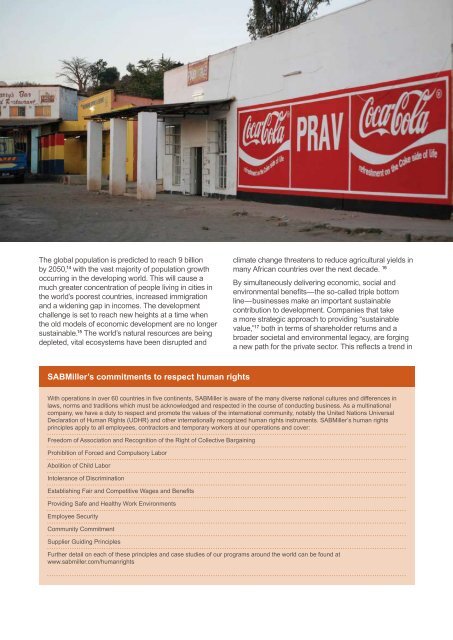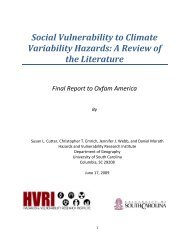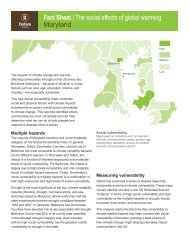Poverty Footprint Study on how the Coca Cola - Oxfam America
Poverty Footprint Study on how the Coca Cola - Oxfam America
Poverty Footprint Study on how the Coca Cola - Oxfam America
Create successful ePaper yourself
Turn your PDF publications into a flip-book with our unique Google optimized e-Paper software.
The global populati<strong>on</strong> is predicted to reach 9 billi<strong>on</strong><br />
by 2050, 14 with <strong>the</strong> vast majority of populati<strong>on</strong> growth<br />
occurring in <strong>the</strong> developing world. This will cause a<br />
much greater c<strong>on</strong>centrati<strong>on</strong> of people living in cities in<br />
<strong>the</strong> world’s poorest countries, increased immigrati<strong>on</strong><br />
and a widening gap in incomes. The development<br />
challenge is set to reach new heights at a time when<br />
<strong>the</strong> old models of ec<strong>on</strong>omic development are no l<strong>on</strong>ger<br />
sustainable. 15 The world’s natural resources are being<br />
depleted, vital ecosystems have been disrupted and<br />
SABMiller’s commitments to respect human rights<br />
22 Exploring <strong>the</strong> links between internati<strong>on</strong>al business and poverty reducti<strong>on</strong><br />
climate change threatens to reduce agricultural yields in<br />
many African countries over <strong>the</strong> next decade. 16<br />
By simultaneously delivering ec<strong>on</strong>omic, social and<br />
envir<strong>on</strong>mental benefits—<strong>the</strong> so-called triple bottom<br />
line—businesses make an important sustainable<br />
c<strong>on</strong>tributi<strong>on</strong> to development. Companies that take<br />
a more strategic approach to providing “sustainable<br />
value,” 17 both in terms of shareholder returns and a<br />
broader societal and envir<strong>on</strong>mental legacy, are forging<br />
a new path for <strong>the</strong> private sector. This reflects a trend in<br />
With operati<strong>on</strong>s in over 60 countries in five c<strong>on</strong>tinents, SABMiller is aware of <strong>the</strong> many diverse nati<strong>on</strong>al cultures and differences in<br />
laws, norms and traditi<strong>on</strong>s which must be acknowledged and respected in <strong>the</strong> course of c<strong>on</strong>ducting business. As a multinati<strong>on</strong>al<br />
company, we have a duty to respect and promote <strong>the</strong> values of <strong>the</strong> internati<strong>on</strong>al community, notably <strong>the</strong> United Nati<strong>on</strong>s Universal<br />
Declarati<strong>on</strong> of Human Rights (UDHR) and o<strong>the</strong>r internati<strong>on</strong>ally recognized human rights instruments. SABMiller’s human rights<br />
principles apply to all employees, c<strong>on</strong>tractors and temporary workers at our operati<strong>on</strong>s and cover:<br />
Freedom of Associati<strong>on</strong> and Recogniti<strong>on</strong> of <strong>the</strong> Right of Collective Bargaining<br />
Prohibiti<strong>on</strong> of Forced and Compulsory Labor<br />
Aboliti<strong>on</strong> of Child Labor<br />
Intolerance of Discriminati<strong>on</strong><br />
Establishing Fair and Competitive Wages and Benefits<br />
Providing Safe and Healthy Work Envir<strong>on</strong>ments<br />
Employee Security<br />
Community Commitment<br />
Supplier Guiding Principles<br />
Fur<strong>the</strong>r detail <strong>on</strong> each of <strong>the</strong>se principles and case studies of our programs around <strong>the</strong> world can be found at<br />
www.sabmiller.com/humanrights




